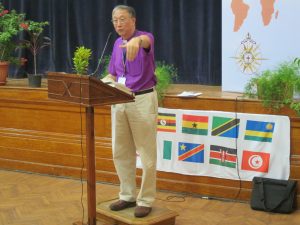A history of the Global South
 Chris Sugden in Cairo
Chris Sugden in Cairo
Day 2 of the Global South Conference began with morning prayer. The Old Testament reading was from 2 Kings 18 1-12 which includes the following:
“Hezekiah….held fast to the Lord and did not stop following him; he kept the commands the Lord had given Moses. And the Lord was with him….the king of Assyria deported Israel to Assyria….This happened because they had not obeyed the Lord their God, but had violated his covenant..They neither listened to the commands nor carried them out.”
At midday Archbishop Mouneer took the Archbishops present and those representing Archbishops to visit the President of Egypt. In the party was Bishop Paul Butler of Durham, representing the Archbishop of Canterbury. There is some unease around the conference that Archbishop Welby has gone with the Primate of TEC to meet with the Pope for the golden anniversary celebrations of the Anglican Centre in Rome: the unease is that the Canterbury communiqué in January specifically said: “given the seriousness of these matters we formally acknowledge this distance by requiring that for a period of three years The Episcopal Church no longer represent us on ecumenical and interfaith bodies, should not be appointed or elected to an internal standing committee and that while participating in the internal bodies of the Anglican Communion, they will not take part in decision making on any issues pertaining to doctrine or polity.”
The morning sessions began with a Bible Reading from Ezekiel 37 “Can these dry bones live?” by Archbishop John Chew, former Primate of South East Asia. He began with a chronological history of the Global South Movement since their first “Encounter” in 1994 at Limuru Kenya through to their postponed meeting in Tunisia for 2015 which this 2016 meeting now fulfills. The origin of the Encounter lay in remarks by Bishop Luke Chhua of Sabah at a mission conference in Brisbane, questioning why they had to meet on agendas determined by others, which led to the first meeting without Lambeth, the ACC of New York so that south to south might share perspectives in doing mission.
Bishop Chew’s theme was that there was no central authority, but these developments were one step at a time as they sought to be faithful. “But for the grace of God we would not be here today”, he said.
His review claimed that the Encounter in Kuala Lumpur in 1997 fed directly into Lambeth 1998 and Lambeth 1.10. Your writer notes ( as he was present at the time) that the Kuala Lumpur statement was indeed referred to in the plenary debate at Lambeth 1998, but by Richard Harries of Oxford. The main actors at Lambeth were the African Archbishops of Kenya, Tanzania and Rwanda. Archbishop Gitari had said at Lambeth 1988 “This was our Lambeth. At the next Lambeth they will have to convince the African bishops to get anything through.”
In 2000, Archbishop Akinola contacted Bishop Mouneer and Archbishop Chew to set the ball rolling again. In November 2003 the Global South prepared some possible responses to TEC if it pulled back or did not pull back from the consecration of Gene Robinson. Thus they were able to release a statement two hours after the consecration in New Hampshire.
In the review given of the various meetings of the Global South in response to the actions of TEC in 2003, it was puzzling that no reference was made to the hundreds of bishops and archbishops who met at Jerusalem in 2008 called by Archbishop Akinola of Nigeria, Henry Orombi of Uganda, Benjamin Nzimbi of Kenya and Donald Mtetemela of Tanzania. History still awaits a full record of that momentous decade from 1998 to 2008.
Bishop Chew then reflected on these events in the light of the exile of God’s people, which was a test of God himself. It threw into question everything the Jews had looked to from God. But God acted for the sake of his name, for the sake of his own honour. Some might have let the dry bones die, without wasting time on them. Bishop Chew reflected that Ezekiel’s silence and dumbness showed that some crises are so deep that silence is needed to allow the real issues to emerge, for a heart of stone to become a heart of flesh, a response that is not easy for those who are active. He warned against rushing in with solutions. Only the exile could bring the reformation that was needed he concluded.





